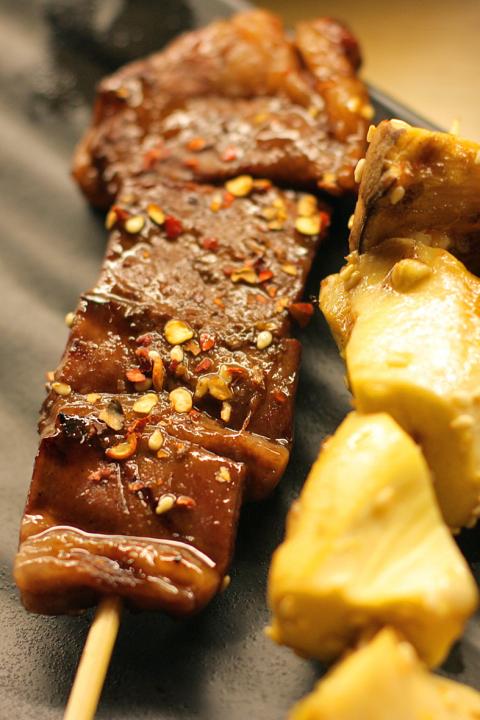Ma (麻醉坊), a yakitori restaurant that opened three months ago on Yongkang Street, packs a lot into a tiny storefront. The interior is simple, but sleekly appointed and darkly lit. Pounding dance music plays over speakers, live sports are projected onto a wall and meats are grilled in an open kitchen that looks out onto the street. Ma may not be able to decide if it is just a modern yakitori or a combination yakitori-sports bar (it offers a short menu of imported beers and cocktails), but its grilled meats are uniformly juicy and delicious.
The restaurant’s signature is a combination of spices used in Sichuan cooking, which are sprinkled over meats and mushrooms after grilling. The mala (麻辣, literally “numb, spicy”) items I had did not make my tongue tingle, but they had enough piquancy to add kick without distracting from the flavors of the beef, chicken and pork.
Many of Ma’s grilled options are on the pricey side, ranging from NT$60 to NT$80 for a single skewer. For the best value, order a set meal featuring different cuts of beef or pork. Either set costs NT$300 and includes two light appetizers, three skewers of meat, one skewer of mushrooms and a non-alcoholic drink. Ma only has one grill and even though the restaurant is small, service can be slow when the dining room is full. On a weeknight, my appetizers and cocktail arrived almost immediately, but 20 minutes passed before my first skewer of mala beef shoulder (麻辣牛肩) finally appeared. It was so tender, succulent and flavorful that it almost made up for the wait. In addition to mala spices, you can also choose to have your meat flavored with cumin or salt. The latter option is a good choice for fattier cuts, like the beef shortribs or the unappetizing sounding but delicious chicken butt (雞軟骨 — Ma calls it “chicken cartilage” in Chinese, but we know what it is), which is fatty and covered in crispy skin.

Photo: Catherine Shu, Taipei Times
Ma has several options to make sure you get some vegetables in between all the skewers of meat. King oyster mushrooms (杏鮑菇) are best when brushed with rich, creamy butter and very lightly sprinkled with sesame seeds. There are several bacon-wrapped veggies on the a la carte menu. Scallions are the classic variety, but the golden needle mushrooms have a pleasant crunch and soak up the bacon juices very well.
Ma’s appetizer menu consists mostly of simple, prepared dishes like kimchi. For something a little more special, try their honey burdock (蜂蜜牛蒡, NT$60). The root vegetable is sliced into thin pieces and lightly fried to a golden crisp before being drizzled in a luxuriant coating of honey and sesame seeds. It’s a good dish to nibble on while waiting for your skewers to finally arrive.
Ma’s beverage list includes several cocktails in addition to imported beers, but my lemon highball (檸檬 highball, NT$180) was watery. Heineken (NT$90 for 300ml) is a better bet for a hot evening.

Photo: Catherine Shu, Taipei Times

April 14 to April 20 In March 1947, Sising Katadrepan urged the government to drop the “high mountain people” (高山族) designation for Indigenous Taiwanese and refer to them as “Taiwan people” (台灣族). He considered the term derogatory, arguing that it made them sound like animals. The Taiwan Provincial Government agreed to stop using the term, stating that Indigenous Taiwanese suffered all sorts of discrimination and oppression under the Japanese and were forced to live in the mountains as outsiders to society. Now, under the new regime, they would be seen as equals, thus they should be henceforth

Last week, the the National Immigration Agency (NIA) told the legislature that more than 10,000 naturalized Taiwanese citizens from the People’s Republic of China (PRC) risked having their citizenship revoked if they failed to provide proof that they had renounced their Chinese household registration within the next three months. Renunciation is required under the Act Governing Relations Between the People of the Taiwan Area and the Mainland Area (臺灣地區與大陸地區人民關係條例), as amended in 2004, though it was only a legal requirement after 2000. Prior to that, it had been only an administrative requirement since the Nationality Act (國籍法) was established in

Three big changes have transformed the landscape of Taiwan’s local patronage factions: Increasing Democratic Progressive Party (DPP) involvement, rising new factions and the Chinese Nationalist Party’s (KMT) significantly weakened control. GREEN FACTIONS It is said that “south of the Zhuoshui River (濁水溪), there is no blue-green divide,” meaning that from Yunlin County south there is no difference between KMT and DPP politicians. This is not always true, but there is more than a grain of truth to it. Traditionally, DPP factions are viewed as national entities, with their primary function to secure plum positions in the party and government. This is not unusual

US President Donald Trump’s bid to take back control of the Panama Canal has put his counterpart Jose Raul Mulino in a difficult position and revived fears in the Central American country that US military bases will return. After Trump vowed to reclaim the interoceanic waterway from Chinese influence, US Defense Secretary Pete Hegseth signed an agreement with the Mulino administration last week for the US to deploy troops in areas adjacent to the canal. For more than two decades, after handing over control of the strategically vital waterway to Panama in 1999 and dismantling the bases that protected it, Washington has